 For years there has been lots of discussion about the ’causes’ of ADHD. Some believe that it is poor diet or other environmental exposures. Perhaps poor parenting. Maybe it is just ‘boys being boys’ (though, of course this doesn’t account for the many girls diagnosed with ADHD). And, there are those that contend that medications given to treat ADHD may
For years there has been lots of discussion about the ’causes’ of ADHD. Some believe that it is poor diet or other environmental exposures. Perhaps poor parenting. Maybe it is just ‘boys being boys’ (though, of course this doesn’t account for the many girls diagnosed with ADHD). And, there are those that contend that medications given to treat ADHD may  just be making things worse.
just be making things worse.
However, new research supports some very real neurobiological differences in those living  with ADHD. Psychology Today shares some of the results of a government funded study that considered the ‘brain volume differences between a group of young 4-5 year old children with ADHD who have never been exposed to ADHD medications and a group of typically developing controls’. The results indicate ‘there do exist real brain-based differences that are evident at an early age.’
with ADHD. Psychology Today shares some of the results of a government funded study that considered the ‘brain volume differences between a group of young 4-5 year old children with ADHD who have never been exposed to ADHD medications and a group of typically developing controls’. The results indicate ‘there do exist real brain-based differences that are evident at an early age.’  These findings are pretty interesting, but leads me to wonder, if we could dig deeper, would we find that the cause of these brain differences were in fact due to some type of genetic change related to environmental exposure. I think we are a long way from having all the answers, but new research provides clues and suggests treatment strategies that we can put in play.
These findings are pretty interesting, but leads me to wonder, if we could dig deeper, would we find that the cause of these brain differences were in fact due to some type of genetic change related to environmental exposure. I think we are a long way from having all the answers, but new research provides clues and suggests treatment strategies that we can put in play.
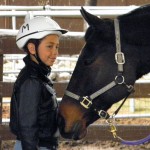 On a positive note, there is some good evidence that Equine Therapy may be linked to functional brain changes in children with Attention-Deficit/Hyperactivity Disorder (ADHD).
On a positive note, there is some good evidence that Equine Therapy may be linked to functional brain changes in children with Attention-Deficit/Hyperactivity Disorder (ADHD).
We see it in the work we do! While children as young as 4 learn the simple tasks of leading, grooming,  tacking-up and riding a horse they are also improving focus, decreasing impulsity, building self-confidence/self-esteem, improving problem solving skills and helping with emotional regulation (and so much more!) Clients
tacking-up and riding a horse they are also improving focus, decreasing impulsity, building self-confidence/self-esteem, improving problem solving skills and helping with emotional regulation (and so much more!) Clients  are highly motivated, as they want to be able to be successful and spend time with ‘their’ horse.
are highly motivated, as they want to be able to be successful and spend time with ‘their’ horse.
Nevada Equine Assisted Therapy is a unique program, as we focus on social, emotional and behavioral growth and learning, as well as providing Psychosocial Rehabilitation (PSR), a mental health intervention, through work with horses. Another unique  feature of our program is that not only do our clients work with their horses on the ground, building mutually respectful and bonded relationships, but they face a whole new set of experiences and challenges once they mount and begin to learn to ride.
feature of our program is that not only do our clients work with their horses on the ground, building mutually respectful and bonded relationships, but they face a whole new set of experiences and challenges once they mount and begin to learn to ride.
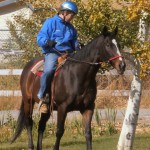 We are here to help. If you or someone one you know are struggling with ADHD or other social, emotional, behavioral or mental health issues, give us a call or send us an email. We can schedule a visit for you. You will tour the ranch, meet our wonderful herd, have an opportunity to share what you are dealing with and to learn more about how we might be able to help.
We are here to help. If you or someone one you know are struggling with ADHD or other social, emotional, behavioral or mental health issues, give us a call or send us an email. We can schedule a visit for you. You will tour the ranch, meet our wonderful herd, have an opportunity to share what you are dealing with and to learn more about how we might be able to help.

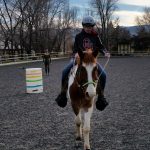 Not surprisingly, I could give you a long list of the things people can learn through work with horses, but today I want to share with you some thoughts on ‘resiliency’.
Not surprisingly, I could give you a long list of the things people can learn through work with horses, but today I want to share with you some thoughts on ‘resiliency’. our clients are dealing with challenges! The learn how to halter and lead a horse. The horse may be tall. The horse may be busy eating when a client goes to halter them. We do encourage our clients to try, at times offering advice, but we don’t just do it for them. We love it when they ask for help, but may also push them to keep trying ‘I know know you can do this’.
our clients are dealing with challenges! The learn how to halter and lead a horse. The horse may be tall. The horse may be busy eating when a client goes to halter them. We do encourage our clients to try, at times offering advice, but we don’t just do it for them. We love it when they ask for help, but may also push them to keep trying ‘I know know you can do this’.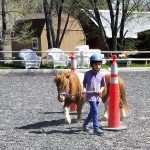 Whether working on the ground or riding, there will be consequences for the choice that clients make. A client may be distracted and looking somewhere else as they try to circle a barrel and all of sudden they find themselves ‘off track’ on an obstacle course. We remind them that if they stay focused and look where they want their horse to go they will have better results and encourage them to try again.
Whether working on the ground or riding, there will be consequences for the choice that clients make. A client may be distracted and looking somewhere else as they try to circle a barrel and all of sudden they find themselves ‘off track’ on an obstacle course. We remind them that if they stay focused and look where they want their horse to go they will have better results and encourage them to try again.  Or perhaps they are working on trotting, but every time they get going they pull back on the reins and their horse stops. We talk about how the horse is getting mixed messages ‘your legs are telling them to go but your hands are telling them to stop. Your horse is not being ‘bad’. They are just confused about what you want’. (This is a perfect opportunity to talk about how we communicate our needs/wants appropriately!)
Or perhaps they are working on trotting, but every time they get going they pull back on the reins and their horse stops. We talk about how the horse is getting mixed messages ‘your legs are telling them to go but your hands are telling them to stop. Your horse is not being ‘bad’. They are just confused about what you want’. (This is a perfect opportunity to talk about how we communicate our needs/wants appropriately!) By offering opportunities to try, to succeed or have challenges, to ask for/receive and accept guidance and by reviewing the things that have not worked well and those that have, through work with horses, our clients build their resiliency.
By offering opportunities to try, to succeed or have challenges, to ask for/receive and accept guidance and by reviewing the things that have not worked well and those that have, through work with horses, our clients build their resiliency.
 talked about in this
talked about in this  – Sleeping problems
– Sleeping problems
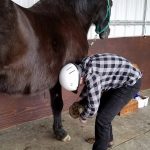 strategies. Through work with horses we help our clients become more comfortable with faced with decisions. They learn to stop, consider, weighing outcomes and maybe finding a different way to get the job done. We also look at improving self-confidence and building/rebuilding self-esteem and of
strategies. Through work with horses we help our clients become more comfortable with faced with decisions. They learn to stop, consider, weighing outcomes and maybe finding a different way to get the job done. We also look at improving self-confidence and building/rebuilding self-esteem and of  Most of my posts are about the social, emotional, behavioral and mental health work we do at Nevada Equine Assisted Therapy, but we offer even more!
Most of my posts are about the social, emotional, behavioral and mental health work we do at Nevada Equine Assisted Therapy, but we offer even more! wellness, coping and leadership skills…’and so much more!
wellness, coping and leadership skills…’and so much more! work with horses. We offer a variety of scheduling options from a couple of hours learning about to horse and herd behavior and how it relates to being a cohesive team, to ongoing work that helps with bigger objectives.
work with horses. We offer a variety of scheduling options from a couple of hours learning about to horse and herd behavior and how it relates to being a cohesive team, to ongoing work that helps with bigger objectives.  south of Reno and 10 min north of Carson and will be happy to share more about this unique and effective approach to growing/building a strong team.
south of Reno and 10 min north of Carson and will be happy to share more about this unique and effective approach to growing/building a strong team. Depression is ‘an often-crippling disease that affects nearly 15 percent of adults worldwide’ (according to the World Health Organization).
Depression is ‘an often-crippling disease that affects nearly 15 percent of adults worldwide’ (according to the World Health Organization). disorder(s)” compared to “nearly 350,000 people with no depression”. This study was looking at ‘gene variants’ and found over 44 of them implicated in depression, “each one contributing in some small way to a person’s risk of depression. Thirty of the gene variants had not been identified
disorder(s)” compared to “nearly 350,000 people with no depression”. This study was looking at ‘gene variants’ and found over 44 of them implicated in depression, “each one contributing in some small way to a person’s risk of depression. Thirty of the gene variants had not been identified  in any previous study”. In other words, Depression can be an extremely individual and variable condition.
in any previous study”. In other words, Depression can be an extremely individual and variable condition. intervention that may offer at least a partial solution for those struggling with depression. Through work with horses and, in partnership with our team of Qualified Mental Health Associates, we address each client’s individual issues. We work under the supervision of a
intervention that may offer at least a partial solution for those struggling with depression. Through work with horses and, in partnership with our team of Qualified Mental Health Associates, we address each client’s individual issues. We work under the supervision of a  Licensed Marriage and Family Counselor and in partnership with other members of each client’s therapeutic team, we create a road map to healing and a happier future.
Licensed Marriage and Family Counselor and in partnership with other members of each client’s therapeutic team, we create a road map to healing and a happier future. We will introduce our wonderful herd, learn more about what you are dealing with and will share how we might be able to help. Call or email us to schedule a visit.
We will introduce our wonderful herd, learn more about what you are dealing with and will share how we might be able to help. Call or email us to schedule a visit. When a member of a family is struggling with something, it often the case that the entire family struggles.
When a member of a family is struggling with something, it often the case that the entire family struggles. done and going to bed, there are a myriad of accommodations that may need to be made. Those with ADHD can require more direction to get simple daily tasks done, so parents may find they have little time for themselves or for siblings. There are school meeting, such as IEPs and often other appointments that need to be managed. Frustration, resentment, depression, exhaustion. So many feelings about what should be a wonderful and joyous time in a families life. This is a very good
done and going to bed, there are a myriad of accommodations that may need to be made. Those with ADHD can require more direction to get simple daily tasks done, so parents may find they have little time for themselves or for siblings. There are school meeting, such as IEPs and often other appointments that need to be managed. Frustration, resentment, depression, exhaustion. So many feelings about what should be a wonderful and joyous time in a families life. This is a very good  At Nevada Equine Assisted Therapy, we strive to support the entire family. Yes, the child or teen is the one working with a QMHA (Qualified Mental Health Associate) and a horse on being focused, less impulsive, making decisions, self-soothing and often so much more. However, we are also an empathetic ear for parents, offering understanding and concrete suggestions for strategies that they can try at home and being there to discuss how it all is going. When scheduling allows, we attend IEP
At Nevada Equine Assisted Therapy, we strive to support the entire family. Yes, the child or teen is the one working with a QMHA (Qualified Mental Health Associate) and a horse on being focused, less impulsive, making decisions, self-soothing and often so much more. However, we are also an empathetic ear for parents, offering understanding and concrete suggestions for strategies that they can try at home and being there to discuss how it all is going. When scheduling allows, we attend IEP meetings so that the parents feel that they have someone on their side of the table who can help them advocate for what their child needs to be successful and when necessary, we can also offer additional resources, such as
meetings so that the parents feel that they have someone on their side of the table who can help them advocate for what their child needs to be successful and when necessary, we can also offer additional resources, such as  and even adults. If you, your child or someone else you know are struggling, give us a call or send us an email so that we can schedule a visit for you. We will show you around the ranch, introduce out wonderful herd to you, learn more about what you are dealing with and share how we may be able to help. Take the first step today.
and even adults. If you, your child or someone else you know are struggling, give us a call or send us an email so that we can schedule a visit for you. We will show you around the ranch, introduce out wonderful herd to you, learn more about what you are dealing with and share how we may be able to help. Take the first step today. Slowly but surely, all across the world, more and more people are coming to understand the unique way that work with horses can help those struggling with social, emotional, behavioral and mental health issues, find a path to healing and happiness.
Slowly but surely, all across the world, more and more people are coming to understand the unique way that work with horses can help those struggling with social, emotional, behavioral and mental health issues, find a path to healing and happiness.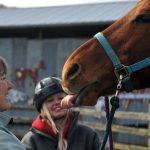 but that the practice of Equine Therapy is showing a lot of promise.
but that the practice of Equine Therapy is showing a lot of promise. we provide social, emotional and behavioral growth and learning, as well as a mental health intervention called Psychosocial Rehabilitation. We get referrals from teachers, parents/caregivers, therapists.
we provide social, emotional and behavioral growth and learning, as well as a mental health intervention called Psychosocial Rehabilitation. We get referrals from teachers, parents/caregivers, therapists.  able to help in so many ways. When we focus on the social, emotional and behavioral component we establish goals with parents, caregivers, or, when working with adults, based on the client’s own specific wishes. These goals may be to increase mindfulness or to help build/rebuild self-confidence, among others.
able to help in so many ways. When we focus on the social, emotional and behavioral component we establish goals with parents, caregivers, or, when working with adults, based on the client’s own specific wishes. These goals may be to increase mindfulness or to help build/rebuild self-confidence, among others.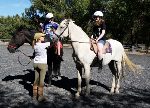 and Qualified Mental Health Associates, working under the supervision of a Licensed Marriage and Family Counselor and of course our incredible herd of horses!
and Qualified Mental Health Associates, working under the supervision of a Licensed Marriage and Family Counselor and of course our incredible herd of horses!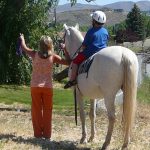 If you or someone you know is struggling with life’s challenges, call us or send us an email. We will schedule a visit to the ranch and introduce our herd. We will learn more about what you are dealing with and share how we might be able to help.
If you or someone you know is struggling with life’s challenges, call us or send us an email. We will schedule a visit to the ranch and introduce our herd. We will learn more about what you are dealing with and share how we might be able to help. We are always looking for research that supports the long term benefits of given therapeutic interventions. In this study, reported in
We are always looking for research that supports the long term benefits of given therapeutic interventions. In this study, reported in  trauma-focused cognitive behavioral therapy and exposure therapy. The article goes on to explain, “Broadly, cognitive behavioral therapy reduces symptoms by changing patient behavior and addressing maladaptive thoughts. In particular, exposure therapy-considered the current standard for PTSD treatment-exposes patients to feared stimuli under deliberate, controlled, safe conditions.”
trauma-focused cognitive behavioral therapy and exposure therapy. The article goes on to explain, “Broadly, cognitive behavioral therapy reduces symptoms by changing patient behavior and addressing maladaptive thoughts. In particular, exposure therapy-considered the current standard for PTSD treatment-exposes patients to feared stimuli under deliberate, controlled, safe conditions.”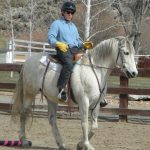 struggling with PTSD and many other social, emotional, behavioral and mental health issues.
struggling with PTSD and many other social, emotional, behavioral and mental health issues.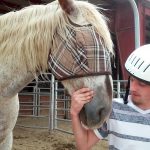 with PTSD, seek help. We are here to be part of a comprehensive treatment plan. We will work with your clinician to provide ancillary support services intended to supplement the work you and your clinician are doing. We would be happy to schedule a time for you to visit the ranch. We will show you around, introduce our incredible herd, learn more about what you are dealing with and will share how we may be able to help. Call or email to set up a visit.
with PTSD, seek help. We are here to be part of a comprehensive treatment plan. We will work with your clinician to provide ancillary support services intended to supplement the work you and your clinician are doing. We would be happy to schedule a time for you to visit the ranch. We will show you around, introduce our incredible herd, learn more about what you are dealing with and will share how we may be able to help. Call or email to set up a visit. The number of people
The number of people  create an ‘Autism-Friendly’ environment. The article shares that there are many steps, from helping those on the spectrum to develop real skills, such as writing a resume, to interview, but that this is only a small part of what needs to happen. There are physical accommodations as well as training for all staff on what it means to be someone with developmental differences and how to make them feel safe and valued. The article really is inspiring in that it gives good, solid
create an ‘Autism-Friendly’ environment. The article shares that there are many steps, from helping those on the spectrum to develop real skills, such as writing a resume, to interview, but that this is only a small part of what needs to happen. There are physical accommodations as well as training for all staff on what it means to be someone with developmental differences and how to make them feel safe and valued. The article really is inspiring in that it gives good, solid  examples of how we can make room for everyone!
examples of how we can make room for everyone!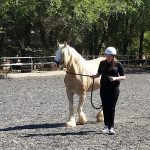 think that means?’ and how to deal with a variety of sensory situations (smells, the way a horse’s coat feels) among other things! At any one time, we may have 2-4 clients working side by side, with their own Qualified Mental Health Associate, so clients may also learn about appropriate
think that means?’ and how to deal with a variety of sensory situations (smells, the way a horse’s coat feels) among other things! At any one time, we may have 2-4 clients working side by side, with their own Qualified Mental Health Associate, so clients may also learn about appropriate  social interactions. Work with horses can be a powerful intervention!
social interactions. Work with horses can be a powerful intervention!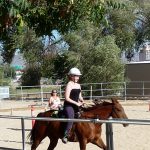 reach their full potential. If you know someone on the spectrum who might benefit from what we have to offer, call or email and we will schedule a time for you to visit. We will show you around, introduce the horses, learn more about what you are dealing with and share how we might be able to help.
reach their full potential. If you know someone on the spectrum who might benefit from what we have to offer, call or email and we will schedule a time for you to visit. We will show you around, introduce the horses, learn more about what you are dealing with and share how we might be able to help. The News-Review
The News-Review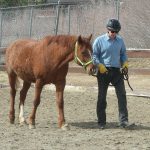 Columbia’s PTSD program views “
Columbia’s PTSD program views “ We know that the result will show what we personally know to be true. Horse are incredible at helping people with PTSD find a path to health and healing. We see it. We live it in the work we do. Our treatment team consists of Qualified Mental Health Associates (QMHA)/PATH Certified Therapeutic
We know that the result will show what we personally know to be true. Horse are incredible at helping people with PTSD find a path to health and healing. We see it. We live it in the work we do. Our treatment team consists of Qualified Mental Health Associates (QMHA)/PATH Certified Therapeutic 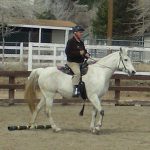 Riding Instructors, working under the supervision of a Licensed Marriage and Family Counselor AND of course our incredible horses. We are here to be a part of a comprehensive treatment program.
Riding Instructors, working under the supervision of a Licensed Marriage and Family Counselor AND of course our incredible horses. We are here to be a part of a comprehensive treatment program. If you, or someone you know, are struggling with PTSD we are here to help. Call of email and we will schedule a time for you to visit the ranch. We will take you on a tour, introduce our wonderful herd, learn more about what you are dealing with and share how we might be able to help.
If you, or someone you know, are struggling with PTSD we are here to help. Call of email and we will schedule a time for you to visit the ranch. We will take you on a tour, introduce our wonderful herd, learn more about what you are dealing with and share how we might be able to help.